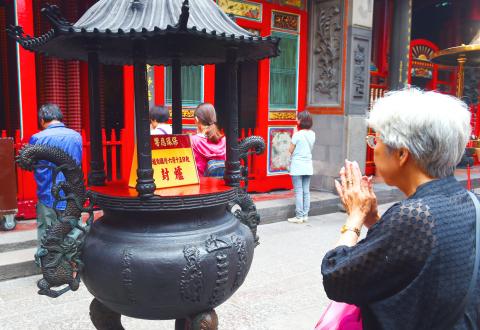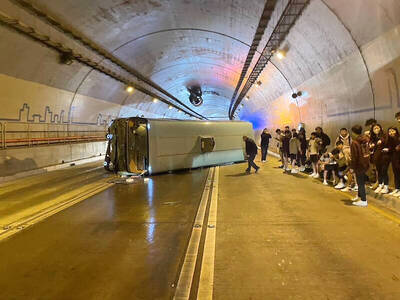Longshan Temple (龍山寺) in Taipei yesterday closed access to more than half of its censers following concerns over incense smoke polluting the surrounding area.
Red lids capped four of the temple’s seven censers, as the temple prepared to move them into storage.
“Doctors at National Taiwan University found that PM2.5 levels near the temple had reached frightening levels,” temple affairs manager Chang Hsueh-ling (張雪玲) said. “Longshan Temple’s deity is full of mercy and wants worshipers to be healthy and at peace.”

Photo: Chien Jung-fong, Taipei Times
Chang said the temple’s board had cast lots three times to ask the permission of Longshan’s main deity — Kuanyin, the goddess of mercy — before passing the new policy.
Located in Taipei’s historic Wanhua District (萬華), the temple has become one of the city’s largest and most famous since it was established in 1738.
A study by National Taiwan University Hospital last month found that levels of airborne particles measuring 2.5 micrometers or less around the temple were 49 times higher than the city average, and 89 times higher than that around Xingtian Temple (行天宮), another famed city temple that banned incense burning last year.
Under the new policy, the temple’s lesser deities are to be allocated only one censer, while the two larger central censers devoted to the temple’s major deities are to remain. Worshipers at the temple customarily insert one stick of incense into each of the temple’s censers.
As part of the new policy, the temple will begin providing three incense sticks for free to any worshiper who requests them, Chang said.
Worshipers are also to be encouraged to use “heart incense,” because a sincere prayer would be heard with or without physical smoke, she added.
The decision to remove some of the censors follows earlier moves by the temple to cut the number of incense sticks inserted into each censer under its order of worship. The temple also stopped accepting donated incense last year due to concerns over pollution caused by poor-quality incense.
Chang said that the policy will be reviewed after three months to see how much pollution levels around the temple were reduced.
The policy change drew a mild reaction from temple worshipers.
Devotee Hsu Ming-yuan (許明源) said the temple deities care more about worshipers’ piety than whether they offer incense, money or other gifts.

The Central Weather Administration (CWA) today issued a "tsunami watch" alert after a magnitude 8.7 earthquake struck off the Kamchatka Peninsula in northeastern Russia earlier in the morning. The quake struck off the east coast of the Kamchatka Peninsula at 7:25am (Taiwan time) at a depth of about 19km, the CWA said, citing figures from the Pacific Tsunami Warning Center. The CWA's Seismological Center said preliminary assessments indicate that a tsunami could reach Taiwan's coastal areas by 1:18pm today. The CWA urged residents along the coast to stay alert and take necessary precautions as waves as high as 1m could hit the southeastern

The National Museum of Taiwan Literature is next month to hold an exhibition in Osaka, Japan, showcasing the rich and unique history of Taiwanese folklore and literature. The exhibition, which is to run from Aug. 10 to Aug. 20 at the city’s Central Public Hall, is part of the “We Taiwan” at Expo 2025 series, highlighting Taiwan’s cultural ties with the international community, National Museum of Taiwan Literature director Chen Ying-fang (陳瑩芳) said. Folklore and literature, among Taiwan’s richest cultural heritages, naturally deserve a central place in the global dialogue, Chen said. Taiwan’s folklore would be immediately apparent at the entrance of the

“China is preparing to invade Taiwan,” Deputy Minister of Foreign Affairs Francois Wu (吳志中) said in an exclusive interview with British media channel Sky News for a special report titled, “Is Taiwan ready for a Chinese invasion?” the Ministry of Foreign Affairs said today in a statement. The 25-minute-long special report by Helen Ann-Smith released yesterday saw Sky News travel to Penghu, Taoyuan and Taipei to discuss the possibility of a Chinese invasion and how Taiwan is preparing for an attack. The film observed emergency response drills, interviewed baseball fans at the Taipei Dome on their views of US President

Speeding and badly maintained roads were the main causes of a school bus accident on a rainy day in Taipei last year that severely injured two people and left 22 with minor injuries, the Taiwan Transportation and Safety Board said. On March 11 last year, a Kang Chiao International School bus overturned inside the Wenshan Tunnel (文山隧道) on the northbound lane of the Xinyi Expressway. The tour bus, owned by Long Lai Co, exceeded the speed limit after entering the tunnel, the board’s investigation found. Sensing that the rear of the vehicle was swaying, the driver attempted to use the service and exhaust